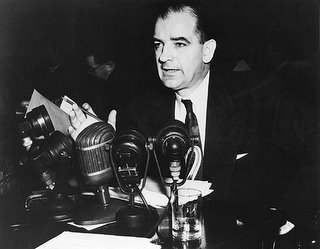
Sen. Joseph McCarthy, Address to the Chicago Irish Fellowship Club (excerpt).
Hank Ballard and the Midnighters, Work With Me Annie.
Hank Ballard and the Midnighters, Annie Had a Baby.
Sons of the Pioneers, Sierra Nevada.
Moon Mullican, What's the Matter With the Mill.
Shirley Gunter & the Queens, Oop Shoop.
Margie Day, Take Out Your False Teeth Daddy.
Lowell Fulson, Reconsider Baby.
The Robins, Riot in Cell Block No. 9.
The Cadillacs, Gloria.
John Lee Hooker, Gotta Boogie.
Sarah Vaughan w/Clifford Brown, September Song.
The Spaniels, Goodnight Sweetheart Goodnight.
To wind down 1954, take a spin around the radio dial again.
On St. Patrick's Day, Senator Joseph McCarthy gave a speech in Chicago in which the usual slurs and allegations about hidden Communists had curdled into something far stranger--there is a bloodlust, almost a wish for death, in his words. Listen, in this excerpt, to the relentless way he keeps tasting the word "Communist," building up to where, almost ecstatically, he describes how Communists "ordered American BOYS to have their HANDS wired behind their BACKS." The next month saw the beginning of the Army-McCarthy hearings, his Waterloo.
Hank Ballard and the Midnighters' "Work With Me Annie" and "Annie Had a Baby"(a made-to-order sequel inspired by a DJ's joke, after playing "Work With Me", that Annie was going to have a baby) sparked a virtue panic among parents, who were horrified to find out their children were listening to blunt odes to sex (and its consequences). Each generation, the farce happens again (cf. "Darling Nikki"). Hank Ballard, who grew up singing in church, is just one of many rock & roll prodigal sons. On Sexy Ways.
The old West, or at least the happy simulacrum of it created in the 1930s and 1940s, was beginning to fade--the Sons of the Pioneers' "Sierra Nevada" is among their last recordings, a pleasant wish for reconciliation, or maybe oblivion. On Hall of Fame Series.
Moon Mullican took the remnants of Western swing and stomped on them--he was laying the trail for Jerry Lee to follow. "Mill," originally by Memphis Minnie, is on Moonshine Jamboree.
"Oop Shoop," by Shirley Gunter, is early girl group bliss, while Margie Day's "Take Out Your False Teeth Daddy," one of the odder and more grotesque double-entendres ever recorded, was a minor R&B hit. Find both here.
Lowell Fulson's electric blues "Reconsider Baby," his first hit for Chess, has such a swagger that you wonder just how hurt Fulson because his girl is leaving him--his eyes are already elsewhere. Find here.
The Robins' "Riot in Cell Block No. 9," was one of the first major Lieber/Stoller hits and one remade a few years later by the Coasters. The Robins' bass singer Bobby Nunn hated the lyrics, so they got Richard Berry, who was hanging around the studio, to sing the lead. The result was a track astonishing in its viciousness--"Pass the dynamite, 'cause the fuse is lit", with drum fills that sound like fists pounding on cell bars.
The Cadillacs' doo-wop hymn "Gloria", released in the summer of 1954, is on the essential Doo Wop Ballads.
"I hear papa tell mama/let him boogie." So John Lee Hooker does, with eight bars of the rawest guitar work possibly ever recorded. On Legendary Modern Recordings.
Sarah Vaughan's masterful take on "September Song" is aided by Clifford Brown on trumpet, Herbie Mann (flute) and Paul Quinichette (tenor sax). On Sarah Vaughan/Clifford Brown.
And say good night with the Spaniels.
Films of '54
A pretty weak year, esp. for Hollywood (Three Coins in the Fountain, The Silver Chalice, blecch, etc., blecch), but a few masterpieces got made, so who's to complain.
Rear Window. Hitchcock made more perverse films, scarier ones, stranger ones, but this is likely his most perfect. Plus Grace Kelly at her most overwhelmingly gorgeous.
Seven Samurai.
Johnny Guitar. "You all think she's some fine lady and that doing nothing makes you fine gentlemen. Well she ain't! And you're not!"
Sanshô dayû (Sansho the Bailiff).
Them!
Track of the Cat. If Eugene O'Neill's Tyrone family had found themselves trapped in a Western.
La Strada.
The Far Country.
Garden of Evil.
Time Out of War.
Yama no oto (Sound of the Mountain).
Yeah, I know, I didn't list On the Waterfront. I really just don't like it. Make your case for it in the comments, if so inclined.
That's it. Next up: 1955, one of the greatest years for pop music in the 20th Century, so any overview is only going to scrape the skin of the surface. Still, we'll give it a shot.
No comments:
Post a Comment